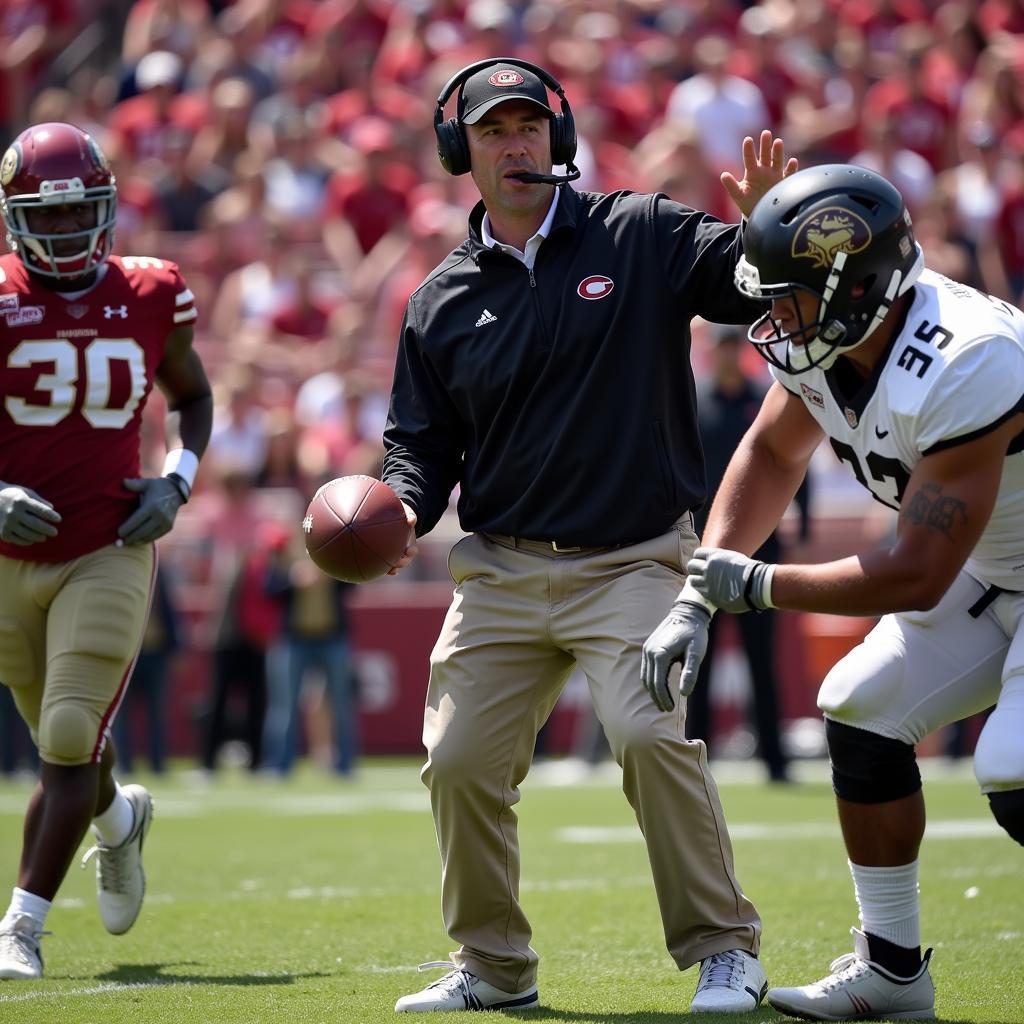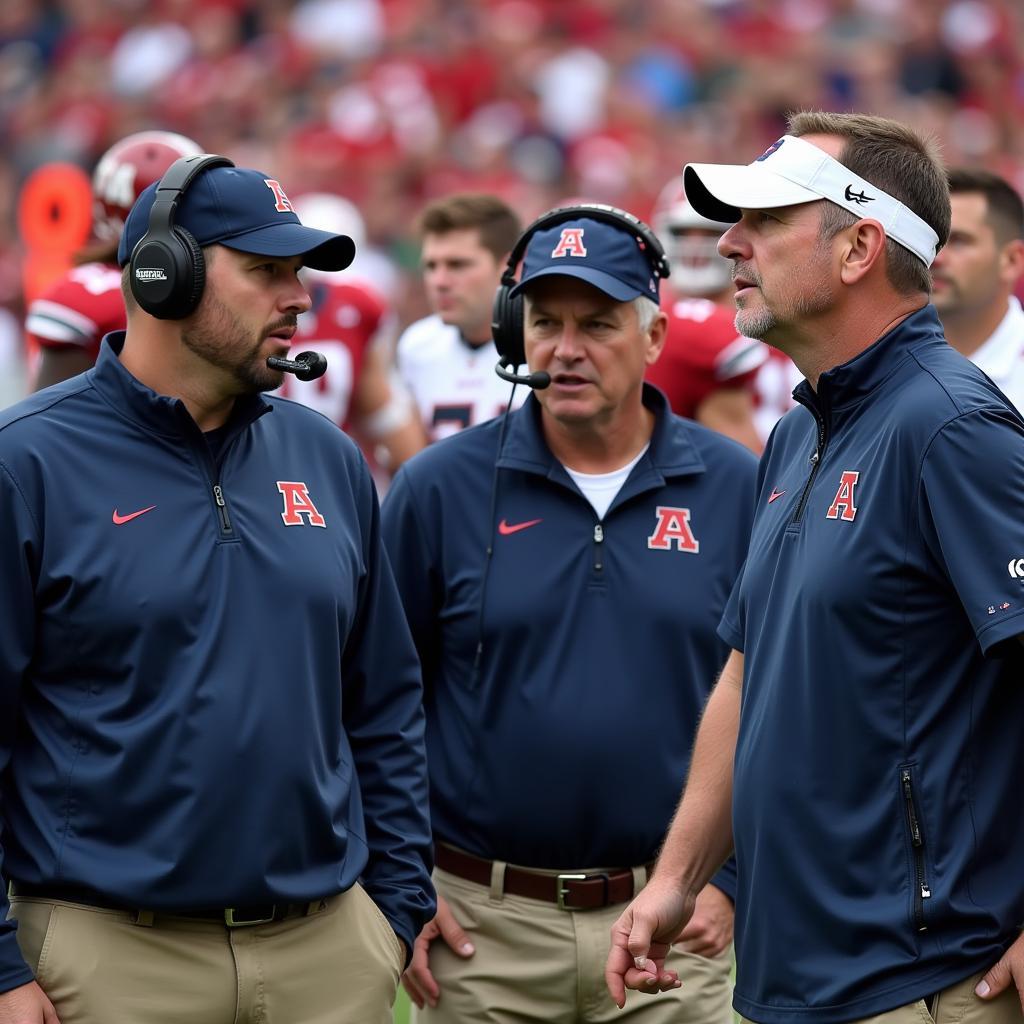In the heat of a college football game, every second counts, and emotions run high. Players, coaches, and fans alike are fully invested in the outcome. Sometimes, this intensity leads to unusual situations, even potentially impacting the game’s result. One such scenario involves an assistant coach touching a live ball, an action governed by specific rules with significant consequences.
When an Assistant Coach Crosses the Line: Understanding the Rules
 Assistant coach reaching for a live football during a college game
Assistant coach reaching for a live football during a college game
The NCAA rulebook is clear: assistant coaches are strictly prohibited from interfering with live play. This includes any contact with the ball while it is in play, regardless of intent. The reasoning is straightforward: assistant coaches are not active participants in the game and any interference could unfairly impact the outcome.
Let’s delve into a hypothetical situation to illustrate the rule’s application. Imagine a close game where Team A is attempting a crucial field goal. As the kick sails through the air, the assistant coach for Team B, caught up in the moment, steps onto the field and inadvertently touches the ball, deflecting it away from the goalpost. This action, though unintentional, constitutes a penalty.
The Penalty: What’s at Stake?
The severity of the penalty for an assistant coach touching a live ball varies depending on the specific circumstances and the referee’s judgment. However, the consequences are always significant and can include:
- Unnecessary Roughness: This penalty results in a 15-yard penalty from the spot of the foul.
- Unsportsmanlike Conduct: This penalty, often assessed in cases of deliberate interference, carries a 15-yard penalty from the succeeding spot.
- Disqualification: In extreme cases involving egregious or unsportsmanlike behavior, the referee may disqualify the assistant coach from the game.
Expert Insight: A Coach’s Perspective
To gain a deeper understanding of the rule’s implications, we spoke to Coach Michael Johnson, a veteran college football coach with over 20 years of experience. Coach Johnson emphasized the importance of coaches maintaining their composure during games.
“Emotions run high on the sidelines, especially in close games,” Coach Johnson explained. “But as coaches, we have a responsibility to remain calm and focused, setting a positive example for our players. Stepping onto the field and touching a live ball, even accidentally, is unacceptable and undermines the integrity of the game.”
Avoiding Controversy: The Importance of Coach Education and Awareness
 College football coaches strategizing on the sidelines during a game
College football coaches strategizing on the sidelines during a game
Preventing such incidents from occurring starts with education and awareness. Coaching staffs must be thoroughly familiar with the rulebook and understand the potential ramifications of their actions. Regular reminders and discussions about on-field conduct should be an integral part of team meetings and practices.
Conclusion
While instances of assistant coaches touching live balls in college football are relatively rare, they underscore the critical importance of adherence to the rules. Coaches, as leaders and role models, have a responsibility to understand and respect the boundaries of their positions. By prioritizing sportsmanship and fair play, we can ensure that college football games remain exciting contests decided by the players on the field, not by inadvertent actions from the sidelines.
FAQ
1. What happens if a coach touches a player who then touches the ball?
If a coach’s contact with a player is deemed to have directly influenced the player’s ability to play the ball, a penalty will be assessed.
2. Can a coach call a timeout from the field of play?
No, only designated players on the field can signal for a timeout.
3. Are there any situations where a coach is allowed on the field during play?
Yes, in cases of injury, a coach may enter the field to attend to an injured player with the referee’s permission.
Need more information about college football rules and regulations? Explore our other articles on [link to other relevant articles on your website].
Have a question? Contact our team at:
Phone: 0869066600
Email: [email protected]
Address: 491 Đ. An Dương Vương, P, Bình Tân, Hồ Chí Minh 71907, Việt Nam.
We’re here to help 24/7!